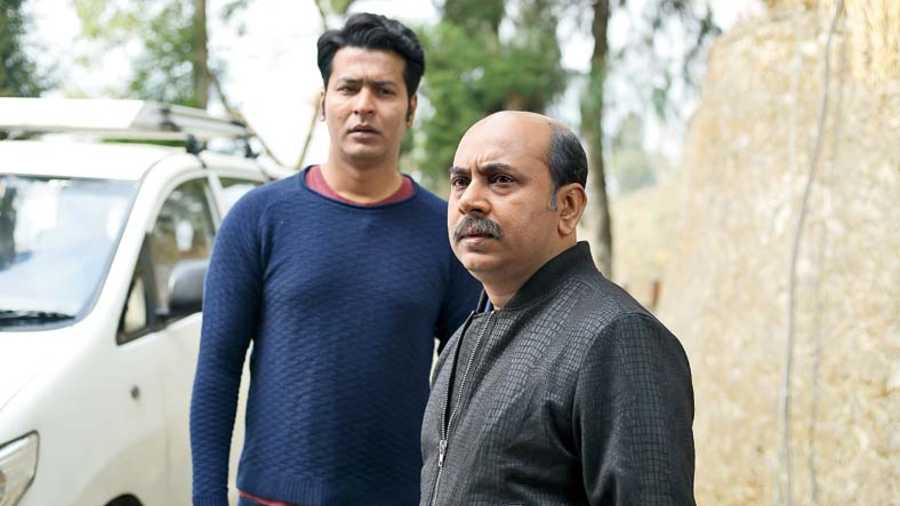-
Anirban Bhattacharya on playing a criminologist in ‘Mukhosh’
Aug 17, 2021 Publication : The Telegraph Online
An anonymous killer, a mysterious vehicle and a mask that conceals darkness, pain and loss. The investigative thriller Mukhosh, directed by Birsa Dasgupta, is all set to release in theatres on August 19. A candid chat with Anirban Bhattacharya, who plays a criminologist in the film….
The trailer of Mukhosh dropped recently. What kind of feedback have you received till now?
The response has been very positive. People are saying that the making is good; they are talking about the glimpses of the performances which they have liked, they are admiring the cinematography.
You play a criminologist who is part of a team that investigates a serial killing case where a killer in a lamb mask is targeting the police. What kind of research work did you do to play the character of a criminologist?
I have not done any research work as such to play a criminologist. The script does not see him or place him like a scientist or something similar. Kingshuk willingly gets involved in the case and with the police department. After reading the script I did not feel I would need to do any specific research on this. We are aware of such a model, a model of performance. Kingshuk falls into that zone. I tried to understand the character, what he is like. Is he inquisitive or attacking or adamant or an introvert? I have tried to understand the human side of this man. This was my quest to play the character.
Did you read certain books on the subject?
I don’t read too many crime thrillers or detective books. Of course, I have read the Byomkesh and Feluda books.
You are part of a team leading an investigation. How is your nature of detection in Mukhosh different from the one that you do as Byomkesh?
Yes, this was the most attractive part about playing this character. He is solving a case. And we understand the concept of a detective as someone who arrives at a solution or solves a case by a process of deduction… which is why this was a challenging role for me, since I play Byomkesh also, and I had to make a difference in body language and expression… the challenge was to make a distinction between the two people. Apart from his capacity for deduction, it is about how Kingshuk is from within. I have tried in my own way to play Kingshuk differently.
What does the title Mukhosh mean to you? What significance does the name have for you?
The title is very apt and inevitable. We can see the use of lamb mask and throughout the film the significance of the mask becomes more relevant. Once you see the film the significance of the title will become clear. I find the name to be very appropriate.
Mukhosh is a remake of the critically-acclaimed Malayalam film Anjaam Pathiraa. Have you seen the original? What is your opinion on making remakes? Can they become relevant and important films if they are written and made well?
No, I haven’t seen the original. The outlook towards remakes has changed. Things were not like this even five years ago. The way we watch content, what we see, and what we want to see has undergone a complete change. We have our binge-lists now. The position for remakes has changed now. Actually, in a philosophical context, nothing is really original in this world now. Everything is derived from somewhere. I don’t have any objections as such against remakes. There are many films in world cinema, like in European or American films. Closer home Laal Singh Chaddha is happening from Forrest Gump, and I feel it is a great initiative. It’ll be great for those who haven’t watched Forrest Gump.
At the same time I am not negating the criticism that was prevalent against remakes. There was a reason behind it. The dominance and pride of Bengali cinema was established and celebrated at one point of time (in the 1950s, 1960s and 1970s). There was the rich legacy of Uttam Kumar and Soumitra Chatterjee. Once remakes of South Indian films started happening, its ego got bruised. That’s when the criticism started.
But many windows have opened for remakes now. There are many franchise films which they make again and again. For example, Sherlock Holmes has been made in so many ways… the same story is being made by various directors and are being fronted by different actors. One has to understand that almost all kinds of stories have been told. And from different perspectives. After exploring so many facets in 100 years of cinema, it is inevitable that it’ll fall into a cycle of repetition.
Things are getting technical now… we hear terms like character sketch, periphery, structure being thrown around for web shows. And this was bound to happen. The nature of exploration is that it has to end somewhere. Cinema’s way of approach is different now. If I feel a Brazilian film is also capturing an urgent reality of my country, my society, then I can think of revisiting it in my language. Right? Let’s not block the windows. It is best to keep them open. Now is the time for global content. Everyone is watching it. If we can adapt it and make it in our own way, then why not? We can tell such stories. Of course Mukhosh is very different from the kind of remakes which was the subject of criticism years ago. Its approach is also different.
How was it like working with actors like Chandreyee Ghosh and Anirban Chakrabarti, and Birsa, the director?
Chandreyee Ghosh is a powerful actress. It was great to share screenspace with her. And you always get a certain vibe from such an actor. And that can happen by just being present on the floor. The vibe creates an excitement. Anirbanda is one of the best actors of our time. I really enjoy working with him. The way we approach a character and project it, is different. That contrast really works and creates an interesting dynamic. Birsada is a versatile director and I really enjoy working with him. He communicates his thoughts, his ideas really well and clearly with actors at a proper time, maybe before the beginning of a shoot or before a shot. I am extremely comfortable working with him.
What goes on in the mind of an actor when your film releases during a pandemic amid uncertainties, with limited seating and safety protocols?
See, Dracula Sir released last year during the pandemic. Covid has turned the world upside down. The waves are taking away so many lives. It is not only a health crisis. It is also affecting our mental health… we are standing on the threshold of a mental crisis as well. I am not in a position to say that we have to go on, go through this… I know from personal experience that there are some who are finding it difficult to go on like this.
Source : bit.ly/3yMTelC



